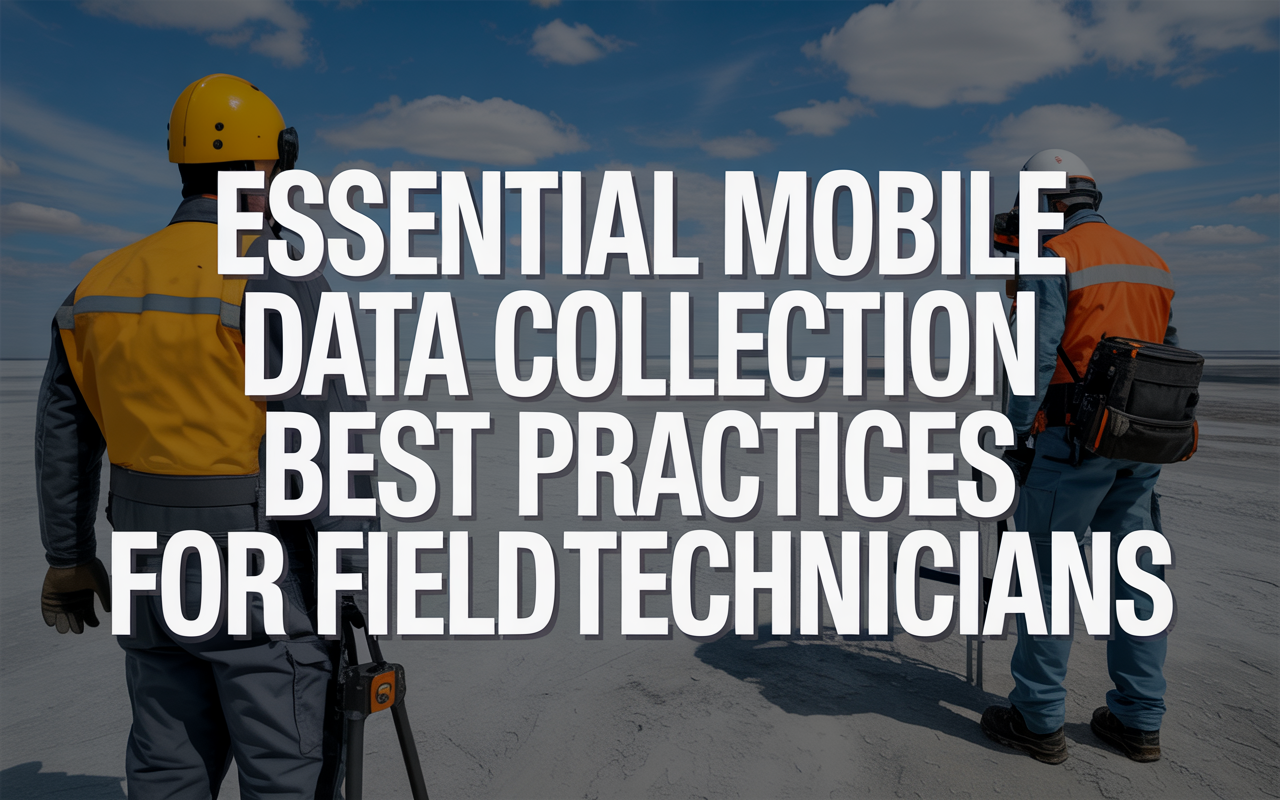Mobile Data Collection Best Practices for Field Technicians
Introduction
In today’s fast-paced world, mobile data collection has become a game-changer for field technicians across industries. Whether in construction, healthcare, utilities, or logistics, collecting accurate and timely data on the go is no longer optional-it’s essential. With advancements in technology, organizations are realizing that strong data collection practices can significantly improve efficiency, accuracy, and decision-making. 🚀
Field technicians are often the backbone of operations, and equipping them with the right tools ensures they can focus on what matters most: delivering quality service. By adopting best practices in mobile data collection, businesses can streamline workflows, reduce errors, and gain valuable insights to stay competitive. Now more than ever, organizations need to embrace these practices to unlock their full potential. 💡
Defining Mobile Data Collection for Field Technicians
Mobile data collection refers to the process of gathering information using mobile devices such as smartphones, tablets, or rugged handhelds. For field technicians, this means replacing outdated paper-based systems with digital tools that allow them to log data directly on-site. This shift not only saves time but also reduces the risk of losing critical information. 📱
The transition from paper to mobile platforms has been driven by the need for faster, more reliable data capture. Technicians can now use apps like those offered by Nektar.io to collect real-time data, integrate with GPS, and even scan barcodes-all from one device. This evolution is transforming how organizations operate, making it easier to adapt to modern challenges while staying efficient. 🌟
Establishing Clear Objectives and Outcomes
Before diving into mobile data collection, it’s crucial to define clear objectives and desired outcomes. Without a roadmap, teams risk collecting irrelevant data that doesn’t contribute to organizational goals. For example, if your goal is to improve customer satisfaction, focus on metrics like response times and issue resolution rates. 🔍
Aligning data collection efforts with specific objectives ensures that every piece of information gathered adds value. It also helps prevent information overload, which can overwhelm teams and dilute the impact of collected data. By starting with a purpose, organizations set themselves up for success right from the beginning. 🎯
Designing Efficient and Focused Forms
When designing forms for mobile data collection, simplicity is key. Long, complicated forms can frustrate users and lead to incomplete submissions. Instead, aim for concise forms with straightforward questions that target only the most essential data points. This approach keeps technicians engaged and improves overall data quality. ✅
“Build your app around the outcome you want, not just the questions you plan to ask. That alignment sharpens every part of the survey process.” -Fulcrum
Incorporating features like dropdown menus, checkboxes, and skip logic can further enhance usability. These elements guide users through the form efficiently, reducing errors and speeding up the process. Remember, the goal is to make data entry as seamless as possible so technicians can focus on their primary tasks. 🛠️
Optimizing Data Collection Tools and Technologies
Selecting the right mobile data collection tool is vital for achieving optimal results. Look for platforms that offer automation capabilities, such as pre-filled fields based on previous entries or automated calculations. Integration with GPS and barcode scanning can also save time and improve accuracy. 🔧
“Construct short, focused forms for data collection to prevent user fatigue and encourage complete responses. Limit questions to those essential for your objectives…” -Eskuad
Compatibility with various operating systems and hardware types is another important factor. Field environments vary greatly, so choosing versatile tools ensures smooth operations regardless of conditions. Platforms like Nektar.io provide flexible solutions tailored to different industries, helping organizations maximize productivity. 🌐
Ensuring Data Quality and Accuracy
To maintain high standards of data quality, implement validation rules and standardized input options like dropdown menus. These measures minimize human error and ensure consistency across all entries. Real-time syncing is another powerful feature that allows data to be updated instantly, reducing the risk of outdated information. 📊
“Features like skip logic, GPS tagging, and calculation fields save time and enhance the quality and utility of what’s collected.” -Fulcrum
Additionally, establish mechanisms for addressing issues in the field. For instance, if a technician encounters a problem while entering data, they should have an easy way to report it. This proactive approach fosters accountability and ensures that any discrepancies are resolved quickly. Accurate data leads to better decisions, benefiting everyone involved. 🤝
Implementing Security and Compliance Standards
Data security is non-negotiable when it comes to mobile data collection. Organizations must prioritize encryption, secure user authentication, and protected data transmission channels to safeguard sensitive information. Compliance with industry regulations, such as GDPR or HIPAA, is equally important to avoid legal repercussions. 🔒
“Ensure the mobile tools used for data collection support real-time data syncing. This capability allows for immediate updates to the central database when information is captured…” -Eskuad
Regular audits and updates to security protocols help maintain a robust defense against cyber threats. By investing in secure technologies, companies demonstrate their commitment to protecting both their data and their reputation. Trust is earned when stakeholders know their information is safe. 🛡️
Preparing for Field Environment Challenges
Field technicians often face unique challenges, such as limited connectivity, extreme weather, or equipment malfunctions. To address these hurdles, select durable devices built for tough environments and plan for offline data collection. Backup procedures are also essential to prevent data loss in case of unexpected disruptions. ⛈️
“Implement robust security protocols to safeguard sensitive data collected on mobile devices. Encryption, secure user authentication, and protected data transmission channels are essential to prevent unauthorized access and data breaches.” -Eskuad
Understanding the specific needs of your field environment is key to overcoming obstacles. For example, in remote areas with poor internet access, apps that support offline functionality can be lifesavers. Planning ahead ensures that technicians remain productive, no matter the circumstances. 🧗♂️
Training and Supporting Field Technicians
Even the best tools are useless without proper training. Providing structured, hands-on sessions helps technicians feel confident using new technologies. Include practical exercises and troubleshooting tips to prepare them for real-world scenarios. 🎓
“It is important to take into account the environment your mobile data collection will take place in… One crucial factor to consider is the reliability of the mobile or Wi-Fi connection in your project region.” -Magpi
Ongoing support is equally important. Create a system for addressing questions or technical issues promptly. This could include dedicated help desks, FAQs, or peer mentoring programs. When technicians feel supported, they’re more likely to embrace digital tools and perform at their best. 🙌
Piloting, Testing, and Refining Data Collection Processes
Pilot testing is a critical step before rolling out a mobile data collection system organization-wide. Conduct small-scale trials to identify usability issues and gather feedback from actual users. This early insight allows you to refine the system for maximum effectiveness. 🧪
“Offer thorough training sessions for all users of the mobile data collection tools. Proper training ensures that every team member can utilize these tools efficiently, leading to more accurate and consistent data collection.” -Eskuad
Use the feedback to tweak forms, adjust workflows, and address any technical glitches. Once the pilot phase is complete, analyze the results to determine readiness for broader deployment. A well-tested system ensures smoother adoption and higher user satisfaction. 🚀
Maintaining and Updating Data Collection Systems
Like any technology, mobile data collection systems require regular maintenance to stay reliable. Schedule routine checks to ensure everything is functioning correctly and update software as needed to fix bugs or add new features. 🛠️
“Conduct pilot tests of your mobile data collection system to identify and address potential issues before widespread deployment. Feedback from these tests can be invaluable in refining the system for better user experience and functionality.” -Eskuad
Encourage user feedback loops to continuously improve the system. Technicians who use the tools daily often have valuable suggestions for enhancements. By staying responsive to their needs, organizations can keep their data collection processes cutting-edge and effective. 🔄
Leveraging Data Insights for Operational Improvement
Data collected by field technicians holds immense potential for driving operational improvements. Managers can analyze trends, identify bottlenecks, and optimize resource allocation to boost efficiency. Evidence-based decisions lead to smarter strategies and better outcomes. 📈
“Using an FSM system that operates a mobile app… allows technicians to fire off reports in real-time… This remotely collected data can then be used… to make informed decisions about where a field service technician can most efficiently be sent to next.” -TechnologyAdvice
For instance, real-time reporting tools provided by platforms like Nektar.io enable managers to track performance metrics and make informed choices about where to send technicians next. Leveraging these insights transforms raw data into actionable intelligence, empowering organizations to excel. 💼
Frequently Asked Questions (FAQ)
What are the most important features in a mobile data collection app for field technicians?
The most important features include real-time syncing, GPS integration, offline functionality, user-friendly interfaces, and robust security protocols. These elements ensure efficiency, accuracy, and protection of sensitive data. 🌟
How can field data collection be performed in areas with no or limited connectivity?
Offline data collection solutions allow technicians to store data locally on their devices until they regain connectivity. Once online, the data automatically syncs with the central database, ensuring no information is lost. 📶
What security measures should organizations implement for collected field data?
Organizations should implement end-to-end encryption, multi-factor authentication, secure data transmission, and regular security audits to protect collected data from unauthorized access and breaches. 🔐
How often should data collection tools and forms be updated?
Data collection tools and forms should be reviewed and updated periodically-at least once a year-to reflect changes in business needs, technological advancements, and user feedback. Regular updates ensure relevance and effectiveness. 🔄
What is the best way to train field technicians in using mobile data collection tools?
The best way to train technicians is through hands-on workshops, interactive tutorials, and ongoing support channels like FAQs and help desks. Combining theory with practice builds confidence and competence. 🎓
Conclusion
By following best practices in mobile data collection, organizations can dramatically enhance efficiency, reliability, and operational insight. From setting clear objectives to designing focused forms, securing data, and preparing for field challenges, each step contributes to a stronger foundation for success. 🏗️
It’s time for organizations and field teams to assess their current processes and adopt these strategies. Investing in the right tools and training will pave the way for successful, secure, and reliable field operations. Partner with experts like Nektar.io to take your mobile data collection to the next level and achieve lasting impact. 🌟



